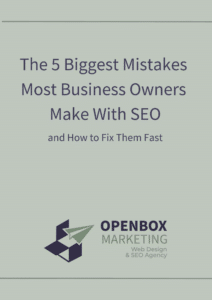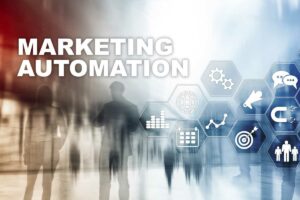Don't let SEO mistakes hinder your business's online success. Download our FREE guide today and unlock the strategies to optimise your visibility and avoid common pitfalls. Take charge and get your guide now!

In recent years, Artificial Intelligence has become a constant in advertising. AI is already making an impact on data analysis, content creation and improved customer service. And that is only the tip of the iceberg. A study published in August 2019 revealed that compared to 2018, there was a 27% increase in adopting AI or machine learning as marketing toolkits. As AI evolves, it will become more relevant for the marketing industry.
In this article, we check how Artificial Intelligence in marketing has grown and how you can harness its power to grow your business.

What is Artificial Intelligence?
Artificial Intelligence or AI is a branch of computer science whose objective is to create computer algorithms and software that can conduct tasks usually requiring elements characteristic of human capabilities like recognising speech, understanding language, decision making or solving problems with the help of complex concepts.
Does AI Need Human Input to Obtain Better Results?
Yes. AI cannot generate good results unless it is “fed” with correct data. This process is known as “prompting in AI“, meaning providing the AI with the right data set and instructions to generate accurate decisions or predictions.
For example, the success of a marketing campaign depends on knowing the target audience. While AI can provide some insights, it cannot replace the human understanding of this target, meaning that AI and humans need to work together to create highly successful marketing campaigns.
How is Artificial Intelligence Used in Marketing?
AI helps streamline business operations and provides valuable inputs about consumer behaviour. AI collects and analyses data, generates content, and learns customer behaviours. This enables businesses to target their consumer audience more accurately, define better marketing strategies and provide more relevant content to engage with customers effectively.
How Does Artificial Intelligence Change Marketing?
It saves time for marketers
AI helps automate repetitive tasks like sending emails to customers or publishing social media posts at scheduled times, saving marketers time they can use for more strategic tasks.
AI tools can generate customer segmentation and analyse customer data and behaviours to highlight trends and patterns, which enable marketers to make quick data-driven decisions. Moreover, chatbots handle many basic customer service inquiries, allowing marketers to achieve better results in less time.
It increases visibility in searches
AI analyses search patterns and user behaviours, allowing search engines to perceive the intent behind a search query and provide more personalised results for a specific target audience.
Artificial Intelligence provides keyword suggestions for search engines, which help companies optimise their content for better ranking in search results. This increases the online visibility of businesses and enables them to reach more target audiences and close more sales.
It improves the customers' experience
Artificial Intelligence in marketing provides personalised interactions in marketing campaigns by analysing customer data and behaviour and generating customised content to match the target audience’s preferences and needs. This provides customers with an improved experience, helping build a relationship of trust and loyalty with your business. This relationship increases the likelihood of repetitive purchases and positive recommendations, giving your company a competitive edge.

What is the Best Example of AI in Marketing?
Artificial Intelligence provides several tools that you can use to improve your marketing results.
Content Creation
Content Creation applications use Machine Learning (ML) algorithms to analyse customers’ data and behaviours and generate content fitting their interests and preferences. From customised product descriptions to social media posts, these tools help achieve better marketing campaign results with less effort and in less time.
However, it is vital to remember that Artificial Intelligence in marketing cannot substitute human creativity and expertise, so marketers first must provide guidance and input and then check the generated content to ensure that content creation applications deliver content in line with the business’s mission and objectives.
Natural Language Processing
Natural Language Processing (or NLP) allows machines to analyse, understand, and draw meaning from human language.
NLP helps analyse customer feedback, monitor social media conversations, and perform sentiment analysis. This enables marketers to better understand their target audience’s needs, allowing them to adjust their campaigns, communication and product development strategies to fulfil them.
Understanding sentiment analysis and mastering NLP concepts can lead to higher customer engagement, which often translates into higher sales for your company.
Marketing automation
Marketing automation has changed how businesses interact with customers by personalising emails and specific customer segments based on their preferences and interests. This tool can automate social media posts and provide insights on when to publish them to increase the chances of being seen by the target audience.
Marketing automation can also conduct follow-up after a sale, sending customers automated “thank-you” messages. This helps your business collect feedback and reviews for your products or services and creates an image of a professional and customer-oriented company.
Image Recognition
Image recognition, a revolutionary AI tool, enables machines to analyse images and videos, identify people, places, and objects, and, in some circumstances, detect emotions.
Image recognition can track and analyse social media posts, find brand logos and products, and identify the sentiment associated with specific imagery. This tool helps marketers customise their campaigns and communication to fit their target audience. It enables businesses to provide improved customer experiences by recommending products and services based on customers’ visual interests and preferences.
Customisation
Customisation consists of delivering highly personalised experiences to customers. Marketers can use different marketing channels for providing customisation, from business websites to email marketing and social media campaigns.
Whether it’s product recommendations, targeted ads, social media campaigns or promotions, AI will create customised content and deliver it to potential and existing customers using their preferred communication channels to increase the chance of closing a sale.
Predictive Analytics
Predictive analytics analyses historical data and uses Machine Learning (ML) algorithms to establish patterns and trends, inputs often used when creating marketing strategies.
This AI tool can help optimise marketing campaigns, determine the most profitable customer segments and forecast revenue growth. A valuable resource for marketers who can make decisions based on data regarding the allocations of resources and investments, predictive analytics can contribute to better financial results for your business.
The use of Artificial Intelligence in marketing is evolving, and businesses need to integrate AI into their marketing strategies and stay connected with its latest developments to gain and retain a competitive advantage in the marketplace.
Share this Article

Janet Podham
Janet Podham is the owner of Openbox Marketing Limited. She has a post-graduate diploma from the University of Otago, majoring in Data Science. She has spent two years studying website design and SEO in the Champions Masters Program at the eBusiness Institute in Australia. She loves helping people and knits for local foster children in her spare time.






